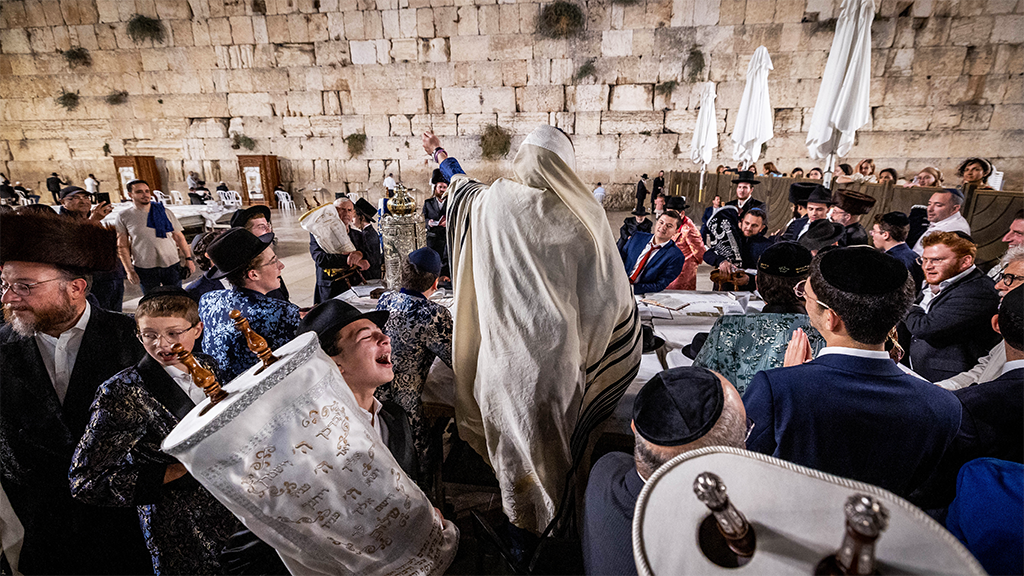Simchat Torah – The Joy of the Torah
‘Seven days is the feast of Sukkot, the Feast of Tabernacles. On the eighth day, the Bible tells us, there shall be a ‘holy convocation’’
Shemini Atzeret
Seven days is the feast of Sukkot, the Feast of Tabernacles. On the eighth day, the Bible tells us, there shall be a ‘holy convocation’ (Leviticus 23:36). In Jewish tradition, this day is called Shemini Atzeret (Eighth Day of Assembly), after Numbers 29:35. The Hebrew ‘Atzeret’ is translated as solemn or closing assembly. Outside Israel, one day is added to every Jewish feast to make sure that celebration in the diaspora would not deviate from celebration in Jerusalem. The Passover meal, for example, is held on two subsequent evenings. This goes back to ancient times, before there was a fixed calendar, when the days of the festivals were determined by observing the moon in Jerusalem. Likewise, Shemini Atzeret is observed for not one, but two days. On the second day, it became customary since the Middle Ages to celebrate the rejoicing of the Torah. That day became known as Simchat Torah, rejoicing the Torah. (In Israel, Simchat Torah and Shemini Atzeret are celebrated together on one day).
Torah
In Judaism, the Torah (the five books of Moses, the first five books of the Old Testament) is read in one year, each Shabbat having its own designated portion. Since ancient times, it has been customary to conclude the cycle of reading with the last chapters of Deuteronomy on Simchat Torah and to begin a new cycle (with the first five chapters of Genesis) on the Shabbat after Sukkot. The Torah is always new and never finished. Therefore, Jews do not wait until the next Shabbat to start the reading of Genesis: the completion of Deuteronomy is followed immediately by the first verses of Genesis.
What is Torah? Often, the word Torah is translated as ‘law’. But it may be better to understand it as instruction, or teaching. God teaches the way to live before Him. The Torah is God’s Word of life.
And therefore, Israel rejoices in the Torah. Before reading the Torah, thanks is given to God who chose Israel, and “who gave us a Torah of truth and thus planted eternal life in us.” The children are blessed with a special blessing, for Jewish life is family life. Everything revolves around the children.
Marriage
So, too, Israel’s relation with the Torah is understood in terms of a covenant of marriage. The person who is honoured with the completion of the annual circle of reading is called the ‘Hattan Torah’, the groom of the Torah. The one who is called up for the reading of the beginning of Genesis is called the ‘Hattan Bereshit’, the groom of Bereshit. ‘Bereshit’ is translated as ‘in the beginning’, and is the first word of the Bible, after which the book of Genesis is called in Hebrew.
During the service, the congregation takes out all the Torah scrolls, and marches around the synagogue, carrying the scrolls. Seven circuits are made with the Torah scrolls. At the completion of each circular procession (hakafa), songs and wordless melodies (niggunim) are sung, and people dance with the Torah. This is done both on the eve of Simchat Torah, and on the day itself.
Yoke
Why is there so much rejoicing in the Law? Judaism knows the concept of taking the yoke of Torah upon oneself (besides taking up the ‘yoke of the kingdom’, which involves the daily recitation of the Shema: “Hear, o Israel, the Lord is our God, the Lord is one” Deuteronomy 6:4). A Jewish girl is considered religiously of age on the day after her 12th birthday. A Jewish boy becomes responsible for his religious duties on the day after his 13th birthday. Then he becomes a ‘bar-mitzvah’ – a ‘son of the commandment’. He takes upon himself the yoke of Torah.
But that yoke is not a burden. If an ox pulled a wagon without a yoke, the rig would cut into the flesh, and the ox would collapse. The yoke enables the ox to pull the wagon without being hurt. A yoke makes it possible to carry a burden together.
‘Take My yoke upon you and learn from Me’
Jesus says: “Take My yoke upon you and learn from Me, for I am gentle and humble in heart, and you will find rest for your souls. For My yoke is easy, and My burden is light” (Matthew 11:29). He is pointing to the positive sides of the yoke. The Torah is not a heavy burden, under which one collapses. True, for the non-Jew, who would think he has to fulfil the commandments to be acceptable for God, it is. That is what Paul and the other apostles warn about (Acts 15:10; Galatians 5:1; 1 Timothy 6:1). For a Jew, who receives the Torah as God’s way of life, it is an easy yoke. For the Torah affirms and enriches life.






